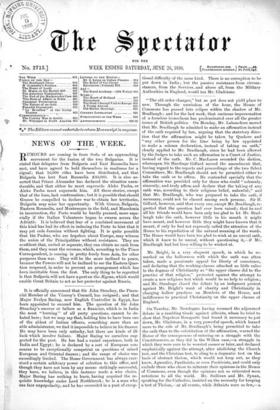"The old order changes," but as yet does not yield
place to new. Through the unwisdom of the hour, the Rollie of Commons has passed into eclipse within the shadow of Mr. Bradlaugh ; and for the last week, that ominous impersonation of a formless iconoclasm has predominated over all the greater issues of British politics. On Monday, Mr. Labouchere moved that Mr. Bradlaugh be admitted to make an affirmation instead of the oath required by law, arguing that the statutory direc- tion that the affirmation might be taken by Quakers and "any other person for the time being by law appointed to make .a. solemn declaration, instead of taking an oath," clearly applied to Mr. Bradlaugh, since he had been allowed by the Judges to take such an affirmation in a Court of Justice, instead of the oath. Mr. C. MacLaren seconded the Motion, whereupon Sir Hardinge Giffard moved the amendment that, having regard to the reports and proceedings of the two Select Committees, Mr. Bradlaugh should not be permitted either to take the oath or to affirm. He contended specially that the affirmation was provided only for those who could " solemnly, sincerely, and truly affirm and declare that the taking of any oath was, according to their religious belief, unlawful ;" and that Mr. Bradlaugh, who was prepared to take the oath, if necessary, could not be classed among such persons. Sir H. Giffard, however, said that every one, except Mr. Bradlaugh, re- gretted that the question had ever been raised ; that he and all his friends would have been only too glad to let Mr. Brad- laugh take the oath, however little in his mouth it might have meant, and however little they might have known that it meant, if only he had not expressly called the attention of the House to his repudiation of the natural meaning of the words. The House would have been too glad to wink at an unreal oath, which it knew to be unreal, without questioning it,—if Mr. Bradlaugh had but been willing to be winked at.


































